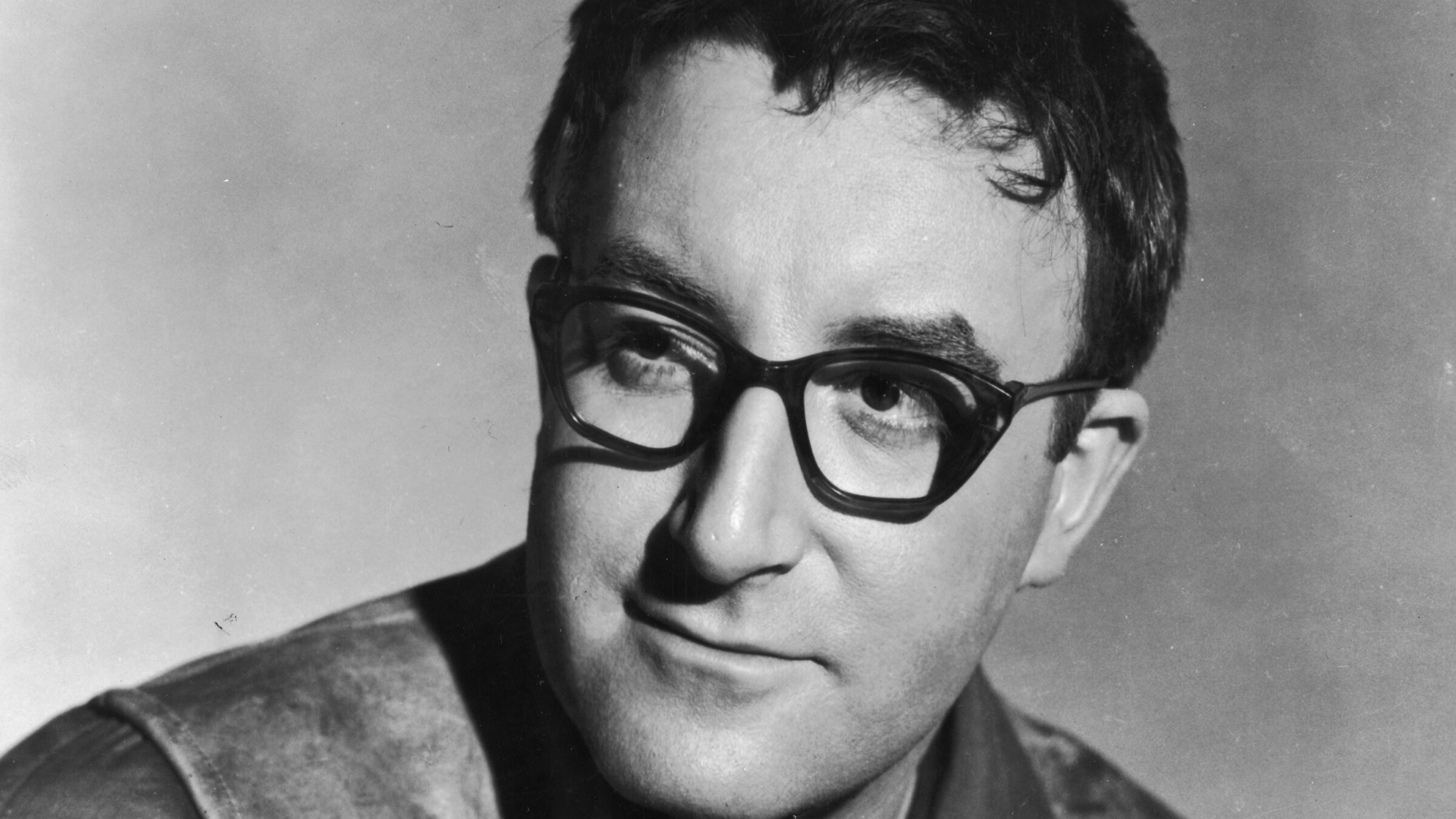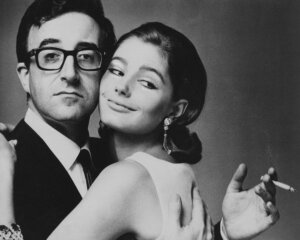100 years later, just how Jewish was Peter Sellers?
The great comedian, who would have turned 100 this year, lived at a time when performers were more discreet about their Jewishness

Peter Sellers, 1959. Photo by Getty Images
Peter Sellers, the Jewish English comedian who was born 100 years ago on Sept. 8, 1925, lived at a time before leading men were generally comfortable identifying as Jews onscreen.
The historian Harry Freedman’s Britain’s Jews observes that Sellers belonged to a generation of English comedians who remained “discreet” about being Jewish.
Apart from Sellers’ roles such as Inspector Clouseau in the Pink Panther series or in one of his final triumphs, 1980’s Being There, in films and radio programs, Sellers’ Jewishness was either implied or mocked in a way that would not be wanted or needed today.
Sellers’ performing brilliance started with wartime jazz drumming in the U.K. touring band of Oscar Rabin, a Latvian Jewish musician. Duplicating speech rhythms with the startling accuracy of a brilliant listener, Sellers was a radio virtuoso, especially in the legendary Goon Show radio program, where ludicrous Jewish characters, like a Judge Schnorrer, abounded.
Long before that, Sellers had impressed the Jewish Dutch impresario Vivian Van Damm, who hired him in 1948 to headline at his Windmill Theatre in London, where he provided comic relief between nude displays.
Sellers would soon be cast as a thug in the comedy film The Ladykillers alongside the actor Alec Guinness, who had played Fagin, the Jewish leader of a gang of pickpockets, in the 1948 adaptation of Charles Dickens’ Oliver Twist, seen by many as an antisemitic caricature. Sellers would later try to follow in Guinness’ footsteps by trying unsuccessfully to be cast in the role of Fagin in Oliver!, the musical version of Dickens’ novel.

In another missed opportunity, the director John Huston reportedly asked Sellers to star in a biopic of Sigmund Freud. Un-Faginlike and certainly unfunny, this part might have delved into psychic complexities that Sellers sought to avoid, so he turned down the offer.
Many coworkers recall that Sellers could be, to put it gently, meshuggeh. But apart from refusing professional treatment, Sellers also showed little curiosity about the factual accuracy of a story that he was directly related to Daniel Mendoza, an 18th-century Sephardic Jewish boxer, through the family of his mother, Agnes Marks.
Mendoza’s biographer Wynn Wheldon states that Sellers merely “claimed” descent from him. Indeed, Sellers apparently was Mendoza’s first cousin four times removed, so not close enough to claim yichis.
But Sellers was regularly pugilistic with colleagues, friends, and family. The Ghost of Peter Sellers, a 2020 documentary by the Hungarian Jewish director Peter Medak, recounted the tsuris of working with Sellers on a 1973 feature film that would remain unreleased.
And Sellers insisted that the American Jewish director Paul Mazursky be fired from I Love You, Alice B. Toklas, a 1968 film which Mazursky had written. In it, Sellers portrayed a rare explicitly Jewish character, Harold Fine, who is liberated by becoming enamored of a flower child of the hippie generation; yet Sellers himself experienced no such freedom, according to film historian Joshua Louis Moss.
Nathan Abrams, author ofStanley Kubrick: New York Jewish Intellectual, asserts that the director Kubrick invited Sellers to play the role of the playwright Clare Quilty in the 1962 film Lolita as an “effeminate Jewish stereotype.” Kubrick sent Sellers recordings of the American jazz producer Norman Granz, of Moldovan Jewish origin, reciting the film script to give an idea of U.S. speech rhythms. An earlier Sellers-Kubrick collaboration, Dr. Strangelove, featured a German scientist character which some film critics, like Valerie Estelle Frankel, suggest could be “read” as Jewish.
In a 1964 comedy, The World of Henry Orient, Sellers played another crypto-Jewish character, based on the American Jewish pianist Oscar Levant. And in the 1966 heist comedy After the Fox, scripted by Neil Simon, Sellers plays what was seen by critics as a New York Jewish con artist transplanted to Italy.
Despite these sometimes negative depictions of Jews, on occasion Sellers worked well with some Jewish colleagues, like the U.S. director Richard Lester (born Liebman). Sellers collaborated with Lester on 1950s TV projects and the Oscar-nominated short film The Running Jumping & Standing Still Film.
Sellers was a devotee of Jewish comedians from his home turf of London’s East End, like Rita Webb, who played comic balabostas onscreen. He had Webb cast in one of the Pink Panther movies. Even more notably, when Jewish film critics such as Stanley Kauffmann and Pauline Kael disdained Mel Brooks’ The Producers, Sellers took out full page ads in Variety and The New York Times, calling Brooks’ movie the “ultimate film” and “essence of all great comedy.”
Years later, in 1974, when invited on a U.K. chat show, he appeared dressed as Franz Liebkind, the befuddled Nazi soldier played by Kenneth Mars in The Producers, and mimicked Mars’ riff about how Hitler was a better painter than Churchill, while the studio audience tittered nervously.
Sellers was a stalwart supporter of the state of Israel. On June 11, 1967, just after the Six-Day War ended, he attended a rally co-organized by Rabbi Harold M. Schulweis of Valley Beth Shalom congregation in Encino, California. There, Sellers pledged support to Israel alongside Jewish stars such as Edward G. Robinson, Danny Kaye, Carl Reiner, Dinah Shore and Nehemiah Persoff.
A few years earlier, Sellers had visited Israel, and in a missive from Haifa to the Jewish English actress Miriam Karlin, he included a mock heroic ode to the Jewish state in the style of William McGonagall, a Scottish poet celebrated a century after his era for writing extremely clumsy verse.
The ode begins, “Oh beautiful Tel Aviv, situated in Israel/ To sing its praise, I must not fail” and is signed “Sellers McGonagall — Poet and Rabbi.”
Clearly on occasion Sellers could be charming, but his brilliant talent to amuse may be overshadowed today by his habit of mocking minority groups onscreen, including East Indians, Chinese, and even LGBTQ+ people (in A Day at the Beach, a 1970 film written by Roman Polanski). These caricatures have aged badly, just as the abundant detail now available about Sellers’ mental and emotional problems as detailed in the 2004 biopic The Life and Death of Peter Sellers tend to drown out the funny.
Sellers’ repeated instances of bad behavior, as recounted by his biographer Ed Sikov, include an undated London episode originally recounted by his friend and associate Spike Milligan. Although accustomed to such episodes, Milligan noted that Sellers tormented a Jewish car salesman, who according to Milligan was “so Jewish in appearance as to make Jewish people look European.” The salesman had committed the unforgivable error of mispronouncing Sellers’ name.
Future generations of Jewish comedy fans are unlikely to make the same mistake, and with any luck, the personal flaws of Sellers will recede from memory as his lasting comedy achievements, often associated with Yiddishkeit, endure.

















